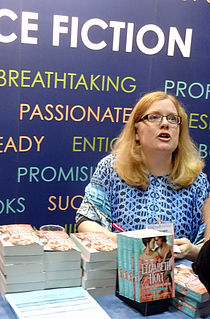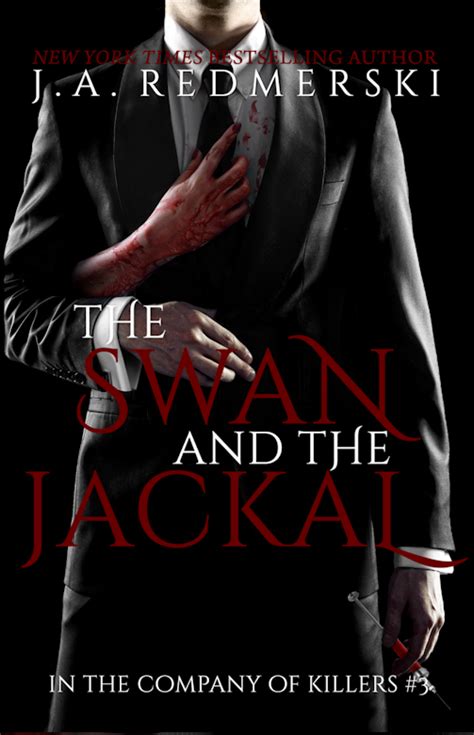A Quote by Jorge Luis Borges
Emma dropped the paper. Her first impression was of a weak feeling in her stomach and in her knees; then of blind guilt, of unreality, of coldness, of fear; then she wished that it were already the next day. Immediately afterwards she realized that that wish was futile because the death of her father was the only thing that had happened in the world, and it would go on happening endlessly.
Quote Topics
Related Quotes
He grunted and stirred, withdrawing from her. She only had a moment to be disappointed and then he flipped her to her back and rose over her, powerful and male. He casually parted her legs with his knees and thrust into her again, hot and hard. She gasped at the swift invasion, the lovely feeling, and then his face was next to hers, his big palms cradling her cheeks. “What I want,” he drawled, “is ye. Nothin’ else.
At that moment a very good thing was happening to her. Four good things had happened to her, in fact, since she came to Misselthwaite Manor. She had felt as if she had understood a robin and that he had understood her; she had run in the wind until her blood had grown warm; she had been healthily hungry for the first time in her life; and she had found out what it was to be sorry for someone.
But she did not take her eyes from the wheels of the second car. And exactly at the moment when the midpoint between the wheels drew level with her, she threw away the red bag, and drawing her head back into her shoulders, fell on her hands under the car, and with a light movement, as though she would rise immediately, dropped on her knees. And at the instant she was terror-stricken at what she was doing. 'Where am I? What am I doing? What for?' She tried to get up, to throw herself back; but something huge and merciless struck her on the head and dragged her down on her back.
She had said she didn't feel fear, but it was a lie; this was her fear: being left alone. Because of one thing she was certain, and it was that she could never love, not like that. Trust a stranger with her flesh? The closeness, the quiet. She couldn't imagine it. Breathing someone else's breath as they breathed yours, touching someone, opening for them? The vulnerability of it made her flush. It would mean submission, letting down her guard, and she wouldn't. Ever. Just the thought made her feel small and weak as a child.
I was bullied by my siblings and cousins, so make-believe was a way in which I could be in charge. When I was like 10 and my sister was about five, I convinced her that she was going to jail because she used a bad word. The doorbell happened to ring, and I told her it was the police. I made her pack her bags. She was crying, and then I said to her, "I forgive you, and I'm gonna tell the cop to go away." Then, of course, she loved me. It was terrible - she still remembers it. I had a sordid sense of humor.
She saw him the first day on board, and then her heart sank into her shoes as she realized at last how much she wanted him. No matter what his past was, no matter what he had done. Which was not to say that she would ever let him know, but only that he moved her chemically more than anyone she had ever met, that all other men seemed pale beside him.
She sat leaning back in her chair, looking ahead, knowing that he was as aware of her as she was of him. She found pleasure in the special self-consciousness it gave her. When she crossed her legs, when she leaned on her arm against the window sill, when she brushed her hair off her forehead - every movement of her body was underscored by a feeling the unadmitted words for which were: Is he seeing it?
The world taught women nothing skillful and then said her work was valueless. It permitted her no opinions and said she did not know how to think. It forbade her to speak in public and said the sex had no orators. It denied her the schools, and said the sex had no genius. It robbed her of every vestige of responsibility, and then called her weak. It taught her that every pleasure must come as a favor from men and when, to gain it, she decked herself in paint and fine feathers, as she had been taught to do, it called her vain.
Suddenly she felt strong and happy. She was not afraid of the darkness or the fog and she knew with a singing in her heart that she would never fear them again. No matter what mists might curl around her in the future, she knew her refuge. She started briskly up the street toward home and the blocks seemed very long. Far, far too long. She caught up her skirts to her knees and began to run lightly. But this time she was not running from fear. She was running because Rhett's arms were at the end of the street.
I found her lying on her stomach, her hind legs stretched out straight, and her front feet folded back under her chest. She had laid her head on his grave. I saw the trail where she had dragged herself through the leaves. The way she lay there, I thought she was alive. I called her name. She made no movement. With the last ounce of strength in her body, she had dragged herself to the grave of Old Dan.
The cycle hit the beach and spun out. Emma went into a rolling crouch as she flew free of it, keeping her elbows in, pushing the air hard out of her lungs. She turned her head as she hit the sand, slapping her palms down to roll herself forward, absorbing the impact of the fall through her arms and shoulders, her knees folding up into her chest. The stars wheeled crazily overhead as she spun, sucking in her breath as her body slowed its rolling. She came to a stop on her back, her hair and clothes full of sand and her ears full of the sound of the wildly crashing ocean.
She remembered that once, when she was a little girl, she had seen a pretty young woman with golden hair down to her knees in a long flowered dress, and had said to her, without thinking, "Are you a princess?" The girl had laughed very kindly at her and asked her what her name was. Blanche remembered going away from her, led by her mother's hand, thinking to herself that the girl really was a princess, but in disguise. And she had resolved that someday, she would dress as though she were a princess in disguise.
She didn’t understand why it was happening,” he said. “I had to tell her she would die. Her social worker said I had to tell her. I had to tell her she would die, so I told her she was going to heaven. She asked if I would be there, and I said that I would not, not yet. But eventually, she said, and I promised that yes, of course, very soon. And I told her that in the meantime we had great family up there that would take care of her. And she asked me when I would be there, and I told her soon. Twenty-two years ago.







































